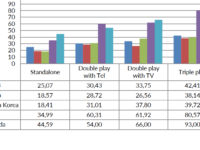The European Commission has released a new study it commissioned on broadband pricing in Europe and several other leading countries. It confirms yet again what Canadian consumers have long suspected: Canada is among the most expensive countries in the developed economy world for broadband Internet services. The study, which provides data on the 2016 retail pricing for consumers throughout the EU, Canada, the U.S., Japan, South Korea, Norway, and Iceland, found Canadians consistently face some of the most expensive pricing regardless of speed or whether the packages include local telephone and television services. The survey was conducted over a two-week period in October 2016 and included retail pricing for five major Canadian ISPs: Bell, Shaw, Rogers, Videotron, and Telus. The data includes procedures to account for one-off fees and other discounts.
Blog
An Industry Divided: How Bell Broke With the Telecom Sector on Copyright
The news that Bell has called on the Canadian government to support radical copyright reform in NAFTA that includes North America-wide mandatory website blocking (to be overseen in Canada by the CRTC) and the full criminalization of copyright represents only the latest step in the transformation of the company into one of Canada’s most aggressive copyright lobbyists and litigators. The Bell proposals go beyond what even the CACN, Canada’s anti-counterfeiting lobby group, has recommended. While copyright lobbying has been led for years by the movie and music industries, Bell has now broken with most other communications companies on copyright policy with policies barely distinguishable from the RIAA or MPAA. In recent years, it has argued against VPN use, used the courts to target a wide range of sites and services, lobbied for copyright reform in trade deals, and become the only telecom company in the world to join the Alliance for Creativity and Entertainment.
Bell Calls for CRTC-Backed Website Blocking System and Complete Criminalization of Copyright in NAFTA
Bell, Canada’s largest telecom company, has called on the government to support radical copyright and broadcast distribution reforms as part of the NAFTA renegotiation. Their proposals include the creation of a mandated website blocking system without judicial review overseen by the CRTC and the complete criminalization of copyright with criminal provisions attached to all commercial infringement. Bell also supports an overhaul of the current retransmission system for broadcasters, supporting a “consent model” that would either keep U.S. channels out of the Canadian market or dramatically increase their cost of access while maintaining simultaneous substitution.
The Bell positions were articulated at hearing this week of the Standing Committee on International Trade on NAFTA (I appeared earlier in the week before the same committee).
Canada’s NAFTA IP and E-commerce Priorities: My Appearance Before the Standing Committee on International Trade
The House of Commons Standing Committee on International Trade has been conducting hearings on the NAFTA negotiations. I appeared before the committee yesterday on a panel that included the dairy industry, food and beverage sector, and my comments on IP and e-commerce. The MPs showed considerable interest in both IP and e-commerce, asking questions about notice-and-notice, fair use, copyright balance, the public domain, and the privacy implications of the e-commerce chapter. My opening remarks are posted below.
Why Copyright Term Matters: Publisher Study Highlights Crucial Role of the Public Domain in Ontario Schools
The Ontario Book Publishers Organization recently published a study funded by the OMDC on the use of Canadian books in English classes in Ontario Public and Catholic schools from Grades 7 to 12. The study surveyed teachers and school boards on which books (including novels, short story collections, creative non-fiction, poetry and plays but not textbooks) are taught in English classes. The goal was to see whether Canadian books were included in class lists. The survey generated hundreds of responses (27 from school board participants and 280 from the Ontario Teachers Federation) resulting references to 695 books by 539 authors.
The OBPO argued that the takeaway from the study is that Canadian books are not well represented in Canadian classrooms since less than a quarter of the mentions referred to a Canadian work and none of the top 10 works were Canadian. While that suggests that there is considerable room to increase the presence of Canadian works in the classroom, the data in the study can be used for other purposes. Working with Sydney Elliott, one of my research assistants, we reviewed the OBPO data to identify the presence of public domain works in Ontario classrooms (ie. the use of works for which the term of copyright has expired).











